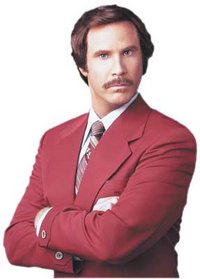Monday, January 30, 2006
Poor Bernard-Henri
I love hatchet-job book reviews, the more vicious the better. Having read one, you imagine the poor author, at home, sobbing, his work flayed before millions of readers. Joe Queenan and P.J. O'Rourke are grandmasters of this particular art, and "The New Republic"--of all places--unleashes a corker every once in while--though of course these tend to be on the more learned end of things. (Leon Wieseltier's demolition of Cornell West is among the harshest, most devestating things I've ever read.)Anyway, Garrison Keiller gives Bernard-Henri Levy a serious thrashing in the Times Book Review this past Sunday. Levy's book is an effort to say something interesting about American culture by retracing his countryman Alexis de Tocqueville's famous steps.
Any American with a big urge to write a book explaining France to the French should read this book first, to get a sense of the hazards involved. Bernard-Henri Lévy is a French writer with a spatter-paint prose style and the grandiosity of a college sophomore; he rambled around this country at the behest of The Atlantic Monthly and now has worked up his notes into a sort of book. It is the classic Freaks, Fatties, Fanatics & Faux Culture Excursion beloved of European journalists for the past 50 years, with stops at Las Vegas to visit a lap-dancing club and a brothel; Beverly Hills; Dealey Plaza in Dallas; Bourbon Street in New Orleans; Graceland; a gun show in Fort Worth; a "partner-swapping club" in San Francisco with a drag queen with mammoth silicone breasts; the Iowa State Fair ("a festival of American kitsch"); Sun City ("gilded apartheid for the old");a stock car race; the Mall of America; Mount Rushmore; a couple of evangelical megachurches; the Mormons of Salt Lake; some Amish; the 2004 national political conventions; Alcatraz - you get the idea. (For some reason he missed the Sturgis Motorcycle Rally, the adult video awards, the grave site of Warren G. Harding and the World's Largest Ball of Twine.) …. There's no reason for it to exist in English, except as evidence that travel need not be broadening and one should be wary of books with Tocqueville in the title.”
“every 10 pages or so, Lévy walks into a wall. About Old Glory, for example. Someone has told him about the rules for proper handling of the flag, and from these (the flag must not be allowed to touch the ground, must be disposed of by burning) he has invented an American flag fetish, a national obsession, a cult of flag worship. Somebody forgot to tell him that to those of us not currently enrolled in the Boy Scouts, these rules aren't a big part of everyday life. He blows a radiator writing about baseball - "this sport that contributes to establishing people's identities and that has truly become part of their civic and patriotic religion, which is baseball" - and when, visiting Cooperstown ("this new Nazareth"), he finds out that Commissioner Bud Selig once laid a wreath at the tomb of the Unknown Soldier at Arlington, where Abner Doubleday is also buried, Lévy goes out of his mind. An event important only to Selig and his immediate family becomes, to Lévy, an official proclamation "before the eyes of America and the world" of Abner as "the pope of the national religion . . . that day not just the town but the entire United States joined in a celebration that had the twofold merit of associating the national pastime with the traditional rural values that Fenimore Cooper's town embodies and also with the patriotic grandeur that the name Doubleday bears." Uh, actually not. Negatory on "pope" and "national" and "entire" and "most" and "embodies" and "Doubleday."
[snip]
And good Lord, the childlike love of paradox - America is magnificent but mad, greedy and modest, drunk with materialism and religiosity, puritan and outrageous, facing toward the future and yet obsessed with its memories. Americans' party loyalty is "very strong and very pliable, extremely tenacious and in the end somewhat empty." Existential and yet devoid of all content and direction. The partner-swapping club is both "libertine" and "conventional," "depraved" and "proper." And so the reader is fascinated and exhausted by Lévy's tedious and original thinking: "A strong bond holds America together, but a minimal one. An attachment of great force, but not fiercely resolute. A place of high - extremely high - symbolic tension, but a neutral one, a nearly empty one." And what's with the flurries of rhetorical questions? Is this how the French talk or is it something they save for books about America? "What is a Republican? What distinguishes a Republican in the America of today from a Democrat?" Lévy writes, like a student padding out a term paper. "What does this experience tell us?" he writes about the Mall of America. "What do we learn about American civilization from this mausoleum of merchandise, this funeral accumulation of false goods and nondesires in this end-of-the-world setting? What is the effect on the Americans of today of this confined space, this aquarium, where only a semblance of life seems to subsist?" And what is one to make of the series of questions - 20 in a row - about Hillary Clinton, in which Lévy implies she is seeking the White House to erase the shame of the Lewinsky affair? Was Lévy aware of the game 20 Questions, commonly played on long car trips in America? Are we to read this passage as a metaphor of American restlessness? Does he understand how irritating this is? Does he? Do you? May I stop now?”

